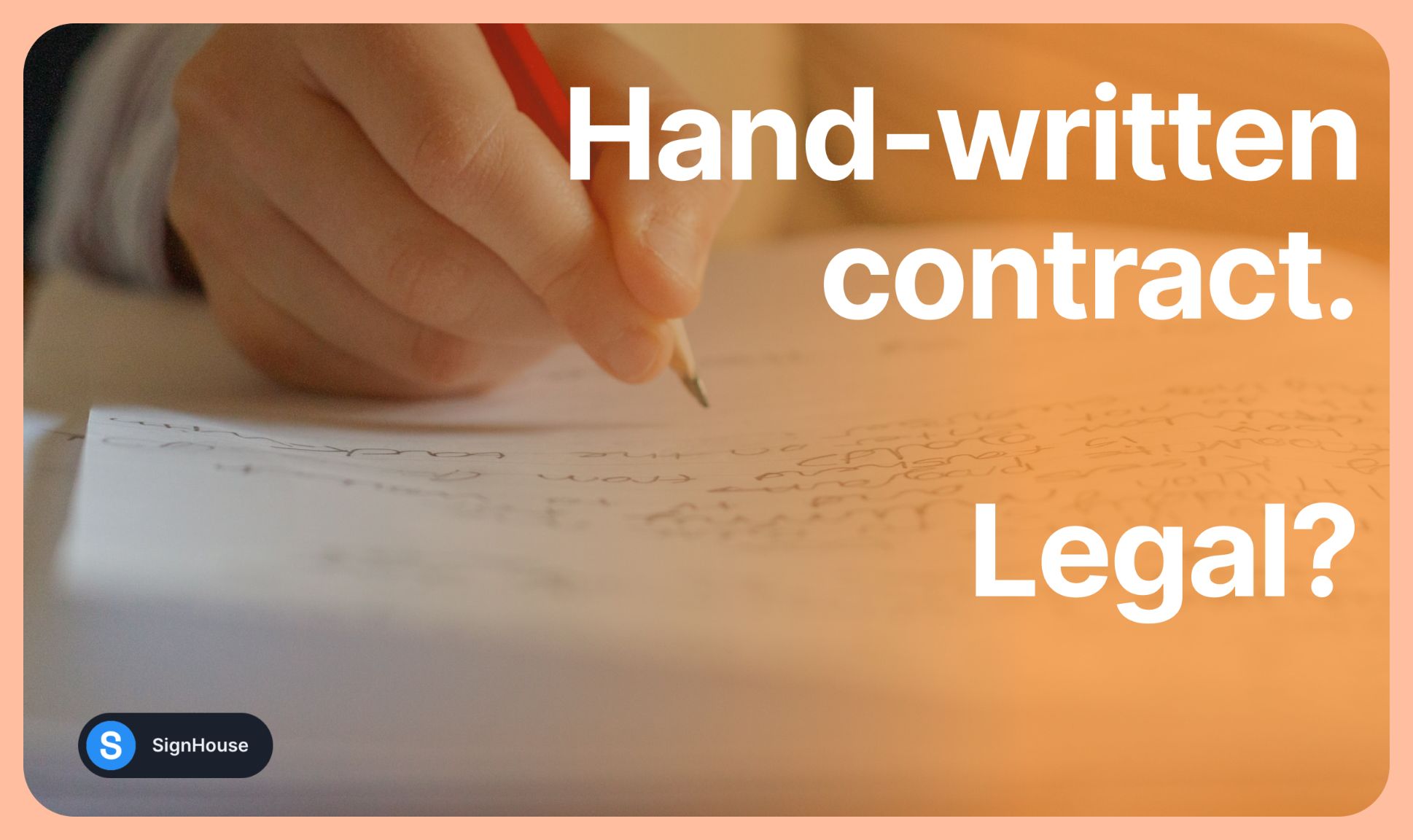Is A Hand Written Agreement Legal?

Let’s say you’re in this situation.
You might have to interact with a handwritten contract.
Then you start asking yourself: is it legal?
Does it hold any weight in court, if it ever gets there?
Should you cross your fingers and hope it never gets to that point?
No need for that.
We’ve talked to hundreds of lawyers to simplify this for you.
Let’s simply explain it.
Is a hand-written contract legally binding?
There are 4 conditions for a contract to be legally binding.
Let’s have a look at them:
- Mutual agreement by both parties
- Legal validity
- Capacity
- Consideration
As long as these 4 conditions are met, a contract is legally binding.
Can those conditions apply to a handwritten contract? The answer is: absolutely yes. They can be, but they have their shortfalls. However, it’s possible to have a hand-written contract that’s as valid as any other contract.
After talking to hundreds of lawyers, we’ve understood that:
- People seem to be taken aback by hand-written contracts, as they consider they’re not legally binding. That’s incorrect.
- How do we know that? Well, think of it this way: before even typewriters, that’s how they used to do it!
- The law has to accommodate for hand-written contracts. Sometimes, one might not be able to not write a contract by hand.
So where does the confusion come from?
It’s true, it looks “less formal”.
But the law is the law.
Should you go for a hand-written legal contract?
The short answer is: if you’re able to, avoid it.
That’s a bit of a bummer, isn’t it?
After walking you through the misconception, now we’re “switching sides”.
Well, not exactly.
Here is why you shouldn’t go for a hand-written legal contract:
- The paper(s) can be lost.
- The document(s) can be damaged, altered, etc. Although measures can be taken against that, it’s still a risk if those measures are not, in fact, adopted.
- Hand-writing can sometimes be misunderstood (or just not understood), if the quality of the writing is bad.
- It could be easily modified — after it’s been signed.
- Not as professional as the alternatives.
- It’s impractical, compared to the other alternatives.
The alternatives imply one of the two.
Number one, either a contract that’s been typed — through a typewriter, or digitally-typed and then printed.
Number two, the best option: using an eSignature software, such as SignHouse.
It’s not so much that the signature is electronic (although that helps as well), but it mostly has to do with the major benefits of using an electronic signature software.
Notably, the most important benefit: the electronic signature software will store the documents, as well as identifiable details from each signee, onto their servers. Ultimately, a 3rd party that is trusted by millions of people and governments, acts as an authority when it comes to the validity of documents.
Can any contract be hand-written?
The Statute of Frauds mentions that certain contracts need to be written in order for them to be legally-binding.
As an implication, the following contracts do not hold weight if they’re hand-written.
- Land sales
- Purchases of goods worth more than $500
- Long-term leases (1 year+)
- Agreements that cover a period of time that lasts past a party’s death
- Debt payments
Regardless, the Statute of Frauds doesn’t mention whether they need to be digitally typed or eSigned.
How to make a handwritten contract legal
Let’s have a look at them:
- Mutual agreement by both parties
- Legal validity
- Capacity
- Consideration
Making a handwritten contract legal would assume you going through the following steps:
- Take out a piece of paper
- Before starting to write, take into consideration the 4 conditions that a contract needs to meet for it to be legal: A) Mutual agreement by both parties, B) Legal validity, C) Capacity, D) Consideration.
- Write as clearly as you can the clauses of the contract
- Have the documents signed and dated by both parties
- Store the documents as safely as you can
Will a handwritten agreement hold up in court?
.jpg)
As long as the 4 conditions needed for a contract or agreement to be considered valid are met, then yes, a handwritten agreement will hold up in court!
The 4 conditions are:
- Mutual agreement by both parties
- Legal validity
- Capacity
- Consideration
Handwritten agreements are 100% enforceable, with the slight exception of what the Statute of Frauds mentions needs to be in writing:
- Land sales
- Purchases of goods worth more than $500
- Long-term leases (1 year+)
- Agreements that cover a period of time that lasts past a party’s death
- Debt payments
Those handwritten agreements will not hold up in court, but they are the exception.
Is A Hand Written Custody Agreement Legal?
The short answer is: It could be legal, as long as the following conditions are met:
- Mutual agreement by both parties
- Legal validity
- Capacity
- Consideration
Those 4 conditions are needed for any contract to be enforceable in a court of Law, regardless of whether it has been handwritten or typed.
That said, you might not want to go forward with a hand-written custody legal agreement.
- The papers can get lost.
- The custody agreement can be easily modified — after it’s been signed.
- The custody agreement can get damaged, folded, etc.
- The writing of each party can be illegible or hard to understand.
Don’t get us wrong: a hand-written custody agreement is 100% legal and enforceable in a court of law.
We simply recommend going for the better option, if it’s possible.
But if the situation does not allow it, then a hand-written custody agreement will work just as fine (as long as the conditions listed above are met).
FAQs
Are your electronic signatures legal?
Our signatures are 100% legally binding, as SignHouse is built around US and International Laws concerning digital signatures. SignHouse eSignatures are on par with paper signatures, from a legal point of view!
Signing papers digitally started being equal to physical, handwritten signatures in the U.S. eSignature Act of 2000 (U.S. Federal Act) + the Uniform Electronic Transaction Act (UETA). As a consequence, laws in other countries have followed suit. SignHouse is built around these laws.
Do signed agreements hold up in court?
Yes, signed agreements hold up in court, but they first need to be valid (before being signed). As long the agreements meet the following 4 conditions, they are valid:
- Mutual agreement by both parties
- Legal validity
- Capacity
- Consideration
A signature added to an agreement is, to put it shortly, the confirmation that you agree with the clauses and conditions.
However, the 4 conditions listed above need to be met in order for the contract/agreement to be enforceable in a court of law.
When the 4 conditions are met + your signature is added, it holds up in court!
How legally binding is a written agreement?
If an agreement is handwritten, it can still be 100% legal and enforceable by a court of law — with small exceptions.
A contract, regardless of whether it's handwritten or not, needs to tick the the following boxes: A) Mutually agreed by both parties, B) Have legal validity, C) Capacity, D) Consideration.
Regarding exceptions: due to the Statute of Frauds, certain contracts need to be written in order for them to be legally-binding:
- Land sales
- Purchases of goods worth more than $500
- Long-term leases (1 year+)
- Agreements that cover a period of time that lasts past a party’s death
- Debt payments
How soon after signing an agreement is it legally binding?
As soon as an agreement has been signed by all parties, in conditions that are fully legal, it starts being enforceable.
NOTE: This only applies if a contract doesn't have an effective date.
Most contracts, however, have an effective date. In other words: a date from which the contract starts being put into action.
However, although it might sound pedantic: the contract is legally binding from the moment when all parties have legally and correctly signed — it becomes legally binding for the effective date.
What makes a contract null and void?
A plethora of things can make a contract null and void:
- It doesn't respect the 4 conditions for it to be enforceable: A contract, regardless of whether it's handwritten or not, needs to tick the the following boxes: A) Mutually agreed by both parties, B) Have legal validity, C) Capacity, D) Consideration.
- It's been tampered with
- It's been damaged
- It's been created by a party that was under the influence
- It's been created by a party that doesn't have the mental facilities
- It presents mistakes
- It presents terms that were violated by any party
- It presents information or data that is misrepresented








